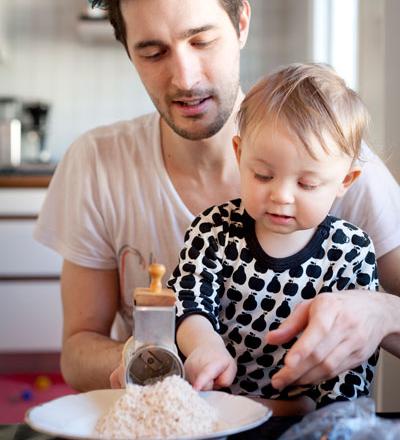You are here
Sweden: Exporting a gender equality model
By Mahmoud Al Abed - Apr 26,2015 - Last updated at Apr 26,2015

STOCKHOLM – Swedes take pride in their gender equality policies, and equality in its broader sense, making sure that such a value is ingrained in every detail of their life.
Swedes are seeking to export their model to the world, as part of an outreach human rights policy, officials and activists told visiting reporters during a recent international media tour of the country.
From a national “feminist” policy to a gender-sensitive educational system, a well-knitted social security system, an “almost flawless” pension regime and international aid policies, Sweden has also taken the battle for equality to actual war fields, with its military spearheading regional efforts to entrench equality between men and women in defence operations, combat and peacekeeping missions.
The “export element” is evident in almost all of these aspects. Even civil society institutions are reaching out to neighbours to share their experiences at various levels.
The incumbent government likes to call itself a “feminist government," as declared by Social Democrat Prime Minister Stefan Loefven late last year. Half of his Cabinet is female in a country where women already constitute half of the workforce, and every piece of legislation caters to rights of women.
According to the spokesperson for family economics at the Swedish Social Insurance Agency, Niklas Logfgren, the country’s gender policies are aimed at striking a balance between work and family life.
That is why the state funds pre-schools, which provide free care and education for children from year one to six. Official curricula have been designed for each level of education, officials explained.
The service allows mothers a free hand to take a full-time job, and at the same time, parents are engaged in the development of their children through regular meetings with educators.
During a meeting with the media delegation at her office on April 16, Minister for Children, the Elderly and Gender Equality Asa Regner said that the government’s feminist policy is designed to fill the gaps, which are narrow “but they are there” in pay and other rights.
It seeks to improve working conditions for women, who constitute only 30 per cent of top managerial posts, while the volume of their pension is 60 per cent of what men receive, due to the fact females tend to take part-time jobs and most of the parental leave to take care of their children, and so their pension rights are affected, she expalined.
The government is working to achieve two goals. The first is to split the one-year parental leave after a child is born into two halves. The first six months should be shared equally by men and women, while they can split the remaining six months in the manner they agree to. The plan is still being debated, with critics arguing that nothing should be imposed on citizens in a democracy like Sweden.
The second goal is to ensure that women take half of the board seats at companies listed on the stock market.
Regner also called for establishing a state agency for gender equality.
There is, of course, an “export element” in this feminist policy.
In a statement on foreign affairs presented to a parliamentary debate in February, the government said that a feminist foreign policy was being formulated, “the purpose of which is to combat discrimination against women, improve conditions for women and contribute to peace and development”.
In a speech in Washington, DC in February this year, Foreign Minister Margot Wallström, the mastermind behind the feminist policy, explained that “discrimination against women enables threats to peace and security” and that “greater gender equality is therefore not only a goal in itself but also a precondition for achieving our foreign, development and security policy objectives”.
Wallström has said that Sweden will advocate for stronger international positions on disarmament and development if elected to a non-permanent seat on the UN Security Council in 2016 for 2017-2019 term.
Stockholm seeks to use that platform to promote its gender equality model, relying on UN Security Council Resolution 1325 of the year 2000, which urges governments to detect and prevent violations of women’s rights amid conflicts. According to Wallström “to this day, there still hasn’t been a peace negotiator who has led a peace process that the UN was involved with, that was a woman”.
Stockholm has proposed appointing an EU representative for gender equality and the implementation of Resolution 1325.
“We will also continue our efforts to combat impunity for gender-based violence, which is necessary both in times of peace and in connection with armed conflicts. UN member states should advance efforts for the human rights of women and girls, their right to economic empowerment and their right to control their own bodies,” the foreign policy statement said.
On an equally important front, the Nordic country has deployed a foreign aid policy applied in 33 countries that benefit from annual assistance worth SEK40 billion (around $4.6 billion).
According to officials at the Swedish International Development Cooperation Agency (SIDA), international aid constitutes 0.7 per cent of the GDP, with gender equality being the main objective of 40 per cent the programmes implemented to help less privileged countries.
Meanwhile, SIDA planners, in fulfilment of the state’s policies, have integrated gender equality in 72 per cent of the entire programmes, which mainly focus on reproductive and maternal health. The highlight is a midwifery programme that is being handled by the foreign ministry as a women’s rights tool.
The SIDA officials said that providing women maternal health services is a requirement of empowerment, serving gender equality purposes at the end of the day.
Even at the level of NGOs and political parties, activists are networking with counterparts interested in their expertise.
Gurdun Schyman, chairperson of the Feminist Initiative, a political party, told reporters that she has been invited to Norway several times to share her party’s experience with activist there.
Schyman, other experts and the government are proud of what have been achieved since earnest activists started a vigorous feminism movement half a century ago, but all agree that perfection is the endgame.
Related Articles
AMMAN — During her first official visit to Jordan, Janine Alm Ericson, Sweden’s State Secretary for International Development Cooperation, a
AMMAN — Sweden’s Ambassador in Amman Alexandra Rydmark on Monday said that her country and Jordan maintain “excellent” cooperation based on
Saudi Arabia will no longer issue business visas to Swedes or renew the current visas of Swedish nationals living in the country, a senior Saudi official told The Associated Press on Thursday.

















